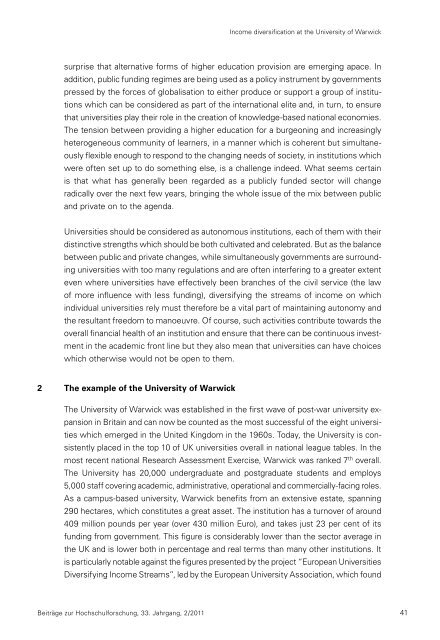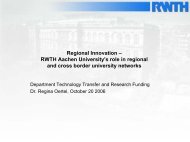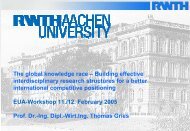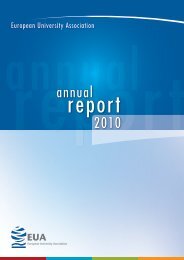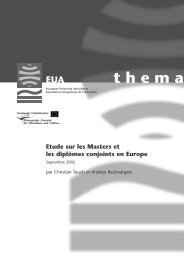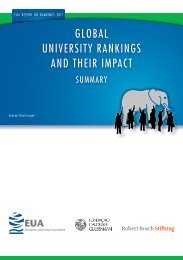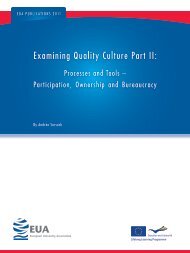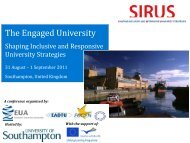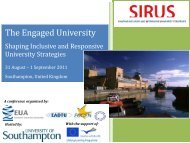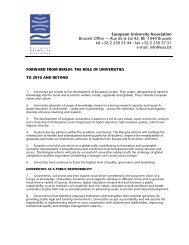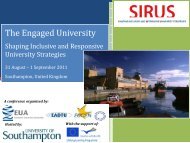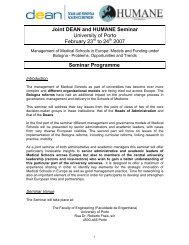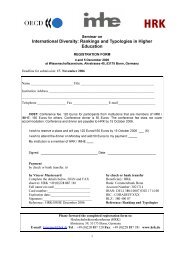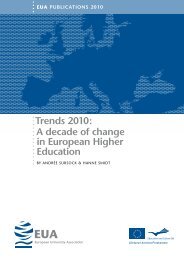Beiträge zur Hochschulforschung - European University Association
Beiträge zur Hochschulforschung - European University Association
Beiträge zur Hochschulforschung - European University Association
You also want an ePaper? Increase the reach of your titles
YUMPU automatically turns print PDFs into web optimized ePapers that Google loves.
Income diversification at the <strong>University</strong> of Warwick<br />
surprise that alternative forms of higher education provision are emerging apace. In<br />
addition, public funding regimes are being used as a policy instrument by governments<br />
pressed by the forces of globalisation to either produce or support a group of institu-<br />
tions which can be considered as part of the international elite and, in turn, to ensure<br />
that universities play their role in the creation of knowledge-based national economies.<br />
The tension between providing a higher education for a burgeoning and increasingly<br />
heterogeneous community of learners, in a manner which is coherent but simultane-<br />
ously flexible enough to respond to the changing needs of society, in institutions which<br />
were often set up to do something else, is a challenge indeed. What seems certain<br />
is that what has generally been regarded as a publicly funded sector will change<br />
radically over the next few years, bringing the whole issue of the mix between public<br />
and private on to the agenda.<br />
Universities should be considered as autonomous institutions, each of them with their<br />
distinctive strengths which should be both cultivated and celebrated. But as the balance<br />
between public and private changes, while simultaneously governments are surround-<br />
ing universities with too many regulations and are often interfering to a greater extent<br />
even where universities have effectively been branches of the civil service (the law<br />
of more influence with less funding), diversifying the streams of income on which<br />
individual universities rely must therefore be a vital part of maintaining autonomy and<br />
the resultant freedom to manoeuvre. Of course, such activities contribute towards the<br />
overall financial health of an institution and ensure that there can be continuous invest-<br />
ment in the academic front line but they also mean that universities can have choices<br />
which otherwise would not be open to them.<br />
2 The example of the <strong>University</strong> of Warwick<br />
The <strong>University</strong> of Warwick was established in the first wave of post-war university ex-<br />
pansion in Britain and can now be counted as the most successful of the eight universi-<br />
ties which emerged in the United Kingdom in the 1960s. Today, the <strong>University</strong> is con-<br />
sistently placed in the top 10 of UK universities overall in national league tables. In the<br />
most recent national Research Assessment Exercise, Warwick was ranked 7 th overall.<br />
The <strong>University</strong> has 20,000 undergraduate and postgraduate students and employs<br />
5,000 staff covering academic, administrative, operational and commercially-facing roles.<br />
As a campus-based university, Warwick benefits from an extensive estate, spanning<br />
290 hectares, which constitutes a great asset. The institution has a turnover of around<br />
409 million pounds per year (over 430 million Euro), and takes just 23 per cent of its<br />
funding from government. This figure is considerably lower than the sector average in<br />
the UK and is lower both in percentage and real terms than many other institutions. It<br />
is particularly notable against the figures presented by the project “<strong>European</strong> Universities<br />
Diversifying Income Streams”, led by the <strong>European</strong> <strong>University</strong> <strong>Association</strong>, which found<br />
<strong>Beiträge</strong> <strong>zur</strong> <strong>Hochschulforschung</strong>, 33. Jahrgang, 2/2011 41


